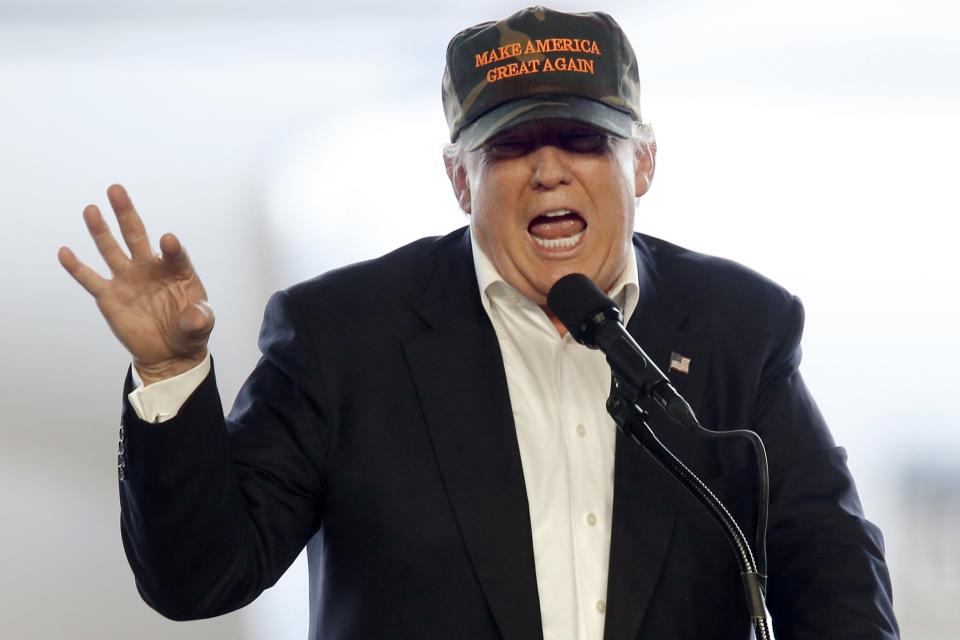In wake of attack, Trump renews call for banning Muslims from U.S.
MANCHESTER, N.H. — Donald Trump on Monday defended his response to the deadly nightclub shooting in Orlando, Fla., insisting in television interviews that the attack proves he was “right” in calling for a ban on Muslim immigrants, who, he claims, are entering the country to plot terrorist attacks.
But pressed on how his proposed ban would have stopped Sunday’s massacre, which authorities say was perpetrated by an American-born citizen, the presumptive Republican presidential nominee simply doubled down on the policy, suggesting immigrants are entering the country and corrupting people who are already here.
The issue arose at a critical moment in Trump’s campaign, as he was preparing to answer Hillary Clinton’s attack 10 days ago on his temperament and grasp of foreign policy issues. In recent weeks, he has downplayed the call for a ban on Muslim immigration, which was a cornerstone of his campaign during the primary, all but dropping it from his stump speeches.
But the shooting seems to have reenergized the issue for him, and also his insinuations that President Obama identifies with radicalized Muslims who have carried out terrorist attacks like the Orlando shooting.
“Look, we’re led by a man that either is not tough, not smart, or he’s got something else in mind,” Trump told Fox News. “And the something else in mind — you know, people can’t believe it. People cannot, they cannot believe that President Obama is acting the way he acts and can’t even mention the words ‘radical Islamic terrorism.’ There’s something going on. It’s inconceivable. There’s something going on.”
“He doesn’t get it, or he gets it better than anybody understands. It’s one or the other, and either one is unacceptable,” Trump added.
Asked what he meant by those comments in a subsequent interview with NBC’s “Today” show, Trump replied, “Well, there are a lot of people who think maybe he doesn’t want to get it.”
On Monday, Trump called for not only increased surveillance of potential terror suspects, but also of Muslims in the United States in general. He told CBS News that the Muslim community knows “who the bad apples are, where the bad seeds are.” In multiple interviews, Trump implied that Muslims haven’t reported those who have become dangerously radicalized.
“That man yesterday was sick with hate. There are many, many people, thousands of people already in our country that are sick with hate,” Trump told Fox News. “And people that are around him, Muslims know who they are, largely. They know who they are. They have to turn them in. They know who they are. They see them.”
In an interview with ABC’s “Good Morning America,” Trump suggested that “neighbors” of the accused Orlando shooter, Omar Mateen, “knew he had bad intentions” but didn’t report them. Citing that, Trump said, “We have to have a ban on people coming in from Syria and different parts of the world with this philosophy that is so hateful and so horrible.”

Trump’s comments came just hours before a planned policy address on national security that will present his first formal remarks since the Sunday morning shootings. Monday’s speech, which Trump will deliver at St. Anselm College at 2:30 p.m. ET, was originally planned to be the opening of his general-election campaign against Democrat Hillary Clinton, contrasting his candidacy with what he has called her leadership and ethical shortcomings.
But after Sunday’s attack, Trump aides scrambled to recast the speech to focus more on the Orlando attack as well as immigration and national security — though it’s unclear exactly what Trump will say.
The speech is still expected to contrast Trump’s candidacy with Clinton’s, but it could also wade into politically risky territory, addressing the controversial issues that have plagued his campaign, including the proposed Muslim ban, which many Republican lawmakers publicly oppose. Republicans also worry it will raise more questions about Trump’s experience and temperament to be president.
In recent weeks, Trump seemed to have distanced himself from the ban, barely mentioning it at rallies. That prompted some Republicans to privately question whether he was attempting to moderate his position. But Trump revived the subject on Sunday in a series of Twitter messages that reopened questions about his ability to respond to a crisis. As he has in the past, he claimed credit for raising the alarm about radical Islam.
“Appreciate the congrats for being right on radical Islamic terrorism,” Trump wrote.
The comment echoed other remarks Trump has made on Twitter in the aftermath of other deadly terrorist attacks, which critics say have taken on a self-congratulatory tone. “Time & time again, I have been right on terrorism,” Trump wrote in March after a series of deadly bombings in Brussels.
In an interview with NBC Monday, Trump defended his tone, insisting he was just responding to supporters who had offered their congratulations because “I’ve been the one that predicted it.” But he added, “I don’t want the credit … I want you to be strong and vigilant, and I want you to be smart.”
Related slideshows:
Slideshow: Victims of the Florida nightclub shooting >>>
Slideshow: Front-page coverage of the Orlando mass shooting >>>


